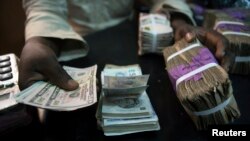Few Nigerians are applauding the collapse of oil prices, which has hit the economy of Africa's top crude producer hard and hammered its currency, the naira.
But for the currency hawkers hanging around outside Abuja's Sheraton hotel, business has seldom been so good as wealthy Nigerians turn to the black market - sometimes changing up to $200,000 at a time - to dodge increasingly onerous FX regulations.
In other African crude producers such as Angola and South Sudan, the sharp drop in oil receipts has caused the official supply of dollars to dry up, paralyzing day-to-day commerce and leaving some travellers stranded cashless at airports.
In South Sudan, one of the world's poorest countries, the formal central bank rate is 2.95 pounds to the dollar, but traders say the bank refused to sell, forcing them to resort to the streets where the greenback is worth more than double its official rate.
"Access to dollars is a problem for me," said Ahmed Oman, a Somalia market trader in Juba, the war-scarred and landlocked state's dusty capital city.
In Nigeria, holding naira has become increasingly unpopular as it has lost its value.
Basic everyday goods can still be paid for in the local currency but many items are scarce and Nigerians need U.S. dollars for imports such as drugs or fabrics sold by small-time traders, to send money to relatives abroad or to purchase western clothes that are important status symbols.
Faced with a massive drop in oil revenues and declining reserves, Nigeria's central bank devalued the naira and then imposed rules restricting access to dollars to all but importing companies to curb what it termed "speculation".
The consequence has been to force more people to the black market, where the currency's rate has fallen as low as 227 this week, more than 10 percent weaker than its official level.
"People buying dollars is increasing," said Adam Musa, head of a group of currency traders sitting in the shade of a tree on an Abuja street where gangs of hawkers flag down passing cars to start negotiations.
Since oil prices slumped over six months ago, rich Nigerians have started turning to the street market, squeezing out smaller fry with orders sometimes totaling as much as $1 million.
"The rich are buying plenty," said Abubakar Shamsedin, another Abuja trader. "I can do $20,000-$50,000 myself. The smallest amounts lately are $1,000-$3,000."
No dollars, no travel
In Angola, Africa's second-biggest crude producer, foreign currency is supposed to be available from bureaux de change but with oil revenues dropping dramatically in the last six months most have run out.
Instead, desperate Angolans have turned to the black market, where the rate has yo-yoed between 150 and 180 kwanza over the last few weeks, against an official level of around 106.
In the capital Luanda, restaurants and shops will happily accept dollars or euros since they have to import nearly all their raw produce.
"For three weeks now, we lost the official supply of U.S. or any other foreign currency," one teller, who did not want to be named, told Reuters as she sat in front of a blank computer screen at a bureau de change in the main airport.
Passengers needing foreign currency were exasperated.
"Where else can we buy it?" one female passenger asked. "We were told by government to buy foreign currency at the airport as long we show our visa and air ticket. What can I do now?"
Similar problems are occurring in Nigeria, where even official bureaux de change are being denied dollars by banks and the central bank, leaving walk-in customers as their only source of hard currency.
"We used to buy directly from customers and the central bank in the past but the central bank is not selling to us," said one agent in Nigeria's commercial capital, Lagos, offering rates of around 223 naira to the greenback.
"It's not the 'street rate' - we are a licensed bureau de change. But it's how we buy that determines how we sell," he added.
In a multi-storied plaza in Abuja that is home to the dozens of shops fronted by signs advertising "Bureau de Change," the mood is glum as licensed dealers struggle to compete with the informal market outside.
"People are holding their money," said Salisu Garu, one licensed dealer who says his dollar turnover has collapsed, reducing his profits to a quarter of the 200,000 naira he used to take home every week.
"You see, only one person has come in while I'm speaking to you - with $700."












